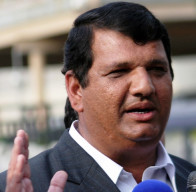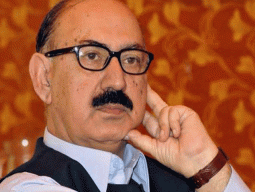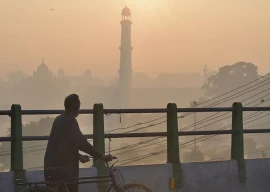While there were dozens of noticeable micro trends in the mix, by and large there was a slightly more androgynous feel to many of the creations. This could be a result of the penetration of the next generation of designers as part of the process to self discovery. However, even the greats, such as Ritu Kumar, Manish Malhotra and Sabyasachi, had slightly toughened up their collections with military accents and collared-shirts over ghagras.
Cholis, usually centre stage, took a back seat to a twist on the style with modern midriff crop tops seen at Payal Singhal, Shehla Khan and Global Desi, among others. At times, they were layered with diaphanous gossamer fabrics and paired with both full skirts and pants. The sporty trend that first came out in the ‘90s has had a style moment globally for more than a year now and hit the Lakme Fashion Week runway in a big way.
Jackets over lehengas, saris, and shararas have been a running trend we picked up on at India Bridal Week and Delhi Couture Week. However, Ritu Kumar took it one step further by presenting flowing ‘red riding hood’ capes tied around the neck with prints inspired by Bhutanese culture. Another prominent mini trend in the same family was the kotis or vests, both long and short, seen at Anita Dongre.
Finally, rural village art was best performed at Gaurang Shah with gorgeous tukri and ajrak patterns in primal colours set against white to make them jump out even more in celebration. It was a festive, timeless collection that, although presented on traditional ghagras and chaadar dupattas, could easily be replicated on any silhouette with equal charm.
Gold statement pants in brocade and metallic fabrics were spotted at Vikram Phadnis and were used mostly with whites. They were complimented by matching gold tailored jackets and blazers for the runway. However, we liked the idea of a pair of gold pants, especially in brocade, assembled with simple neutrals.
Boat necks went missing a while back with the onset of Nehru and shirt collars, but fortunately Manish Malhotra reminded us of their elegance with his repetitive use of the neckline throughout his beautifully understated pastel shararas and mirror work saris. The use of sheer tulle and back buttons was particularly lovely.
Dupattas and pallus were wrapped interestingly around the neck in twisted crushed scarves at Nikhil Thampi, Krishna Mehta, and Global Desi to create a stronger statement than the feminine shoulder drop. An equally effective styling technique to convey a tougher fashion image was the use of belts enveloping military sash like dupattas around the waist and adding on shoulder lapels. These were principally observed at Sabyasachi. Known for his passion of honouring and celebrating the femininity of women through his creations, Sabyasachi balanced this by infusing delicate wide net lace on the bottom half of his saris.
Published in The Express Tribune, September 1st, 2013.
Twitter ID: @Secretclosetpk Secretcloset.pk is an exclusive online fashion portal
Like Life & Style on Facebook, follow @ETLifeandStyle on Twitter for the latest in fashion, gossip and entertainment.
1730672650-0/Lana-(1)1730672650-0-405x300.webp)





1719221511-0/Self-Help-Paradox-(Misleading-Advice)1719221511-0-270x192.webp)










COMMENTS
Comments are moderated and generally will be posted if they are on-topic and not abusive.
For more information, please see our Comments FAQ